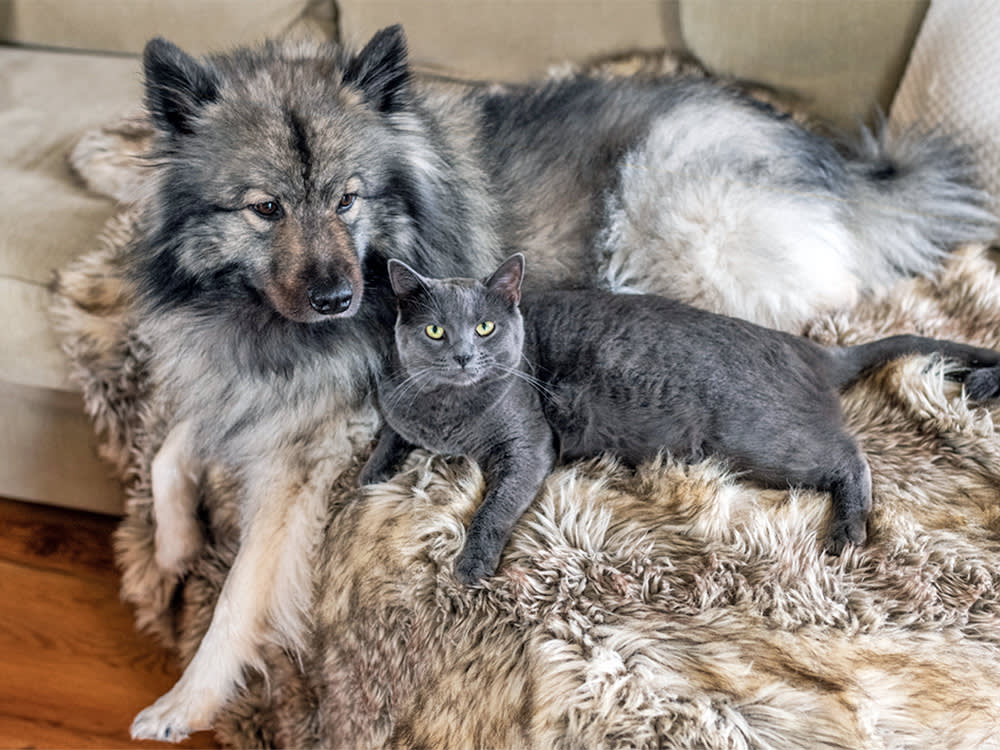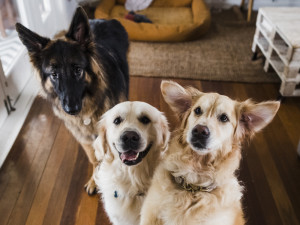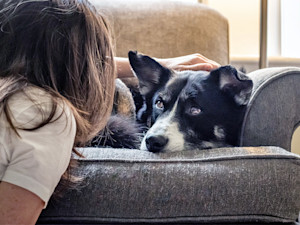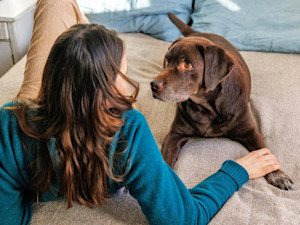Do Dogs “Raised by Cats” Start Acting Like Cats? The Internet Thinks So
It’s the question on TikTok’s mind.

Share Article
If there’s one thing that can get dog people and cat people to see eye to eye, it’s a cat-like dog. Recently, these best-of-both-worlds pets have taken the internet by storm, with TikTok users sharing videos of their pups acting decidedly un-doglike.
“Do you want to see what a Pit Bull raised by cats looks like?” one user asked over a video of their pup. In a series of clips, the Pit Bull lounges in a loaf, rubs his side against his pet parent’s legs, and curls up next to a kitty. In another video, a Golden Retriever “raised by a cat” perches on the highest part of a couch, play-fights by lifting his paws high in the air, and sits in the windowsill. “I’m not a scientist but I think your dog is the equivalent of bilingual in the dog and cat world,” one TikTok user commented.
So… are dogs raised by cats really more cat-like?
According to cat behaviorist Dr. Mikel Delgado, people may be reading a little too much into their pups’ habits — however adorable they might be. “The behaviors in question are not out of the range of ordinary dog behaviors,” Dr. Delgado says. “Dogs will loaf … they are naturally hunters who stalk and watch prey, so these behaviors are not necessarily due to living with a cat. I think people naturally tend to be drawn to similarities and think they are something more than coincidence.”
In fact, animals aren’t really teaching each other all that much, Dr. Delgado says. According to a book calledopens in new tab Animal Cognition: Evolution, Behavior and Cognition by Clive D.L. Wynne and Monique A. R. Udell, the definition of teaching in the animal kingdom “has specific criteria,” Dr. Delgado explains. “The ‘teacher’ modifies their behavior for the benefit of their pupil, and the pupil learns a behavior they would not otherwise.”
Cats, in particular, are unlikely to be intentionally teaching another animal (who’s not their kin) anything. “Cats don’t naturally care for their young past a few months of age,” Dr. Delgado says. “Especially in spayed/neutered pets, there’s no reason to think caretaking behavior similar to raising young would continue or be transferred to another species.”

That said, animals can pick up on the behaviors of other animals around them. For example, one studyopens in new tab published in Royal Society Open Science found that dogs mimic the expressions and motions of other dogs they meet. “Animals certainly show signs of social learning (learning due to the presence of the other animal) but this does not mean there is deliberate teaching or imitation happening,” Dr. Delgado says.
So, while Dr. Delgado cautions against assuming that animals are teaching each other new behaviors, it’s totally possible that our pets are picking up each other’s habits purely by accident through bonding. Whatever the case, the resident pet should take it as a compliment: Imitation is the sincerest form of flattery, after all.

Sio Hornbuckle
Sio Hornbuckle is the Assistant Editor at Kinship, where they frequently write for the site. As a writer, they specialize in pet news, animal science, and pop culture. They live in New York City with their cat, Toni Collette.
Related articles
![3 dogs posed together in a house]()
Does Your Dog Have a Unique Personality?
Yep, research says your dog is as special and perfect as you tell them they are.
![Woman taking a picture of of her golden retriever dog with a phone at home]()
11 TikTok Challenges For Restless Dogs
Viral trends that’ll help your dog (okay, you) through long days of isolation and/or boredom.
Can Dogs Communicate With Each Other?
It’s about more than barking.
![Dog petting dog while he stares at her from the couch.]()
Your Dog Is Judging You—Well, Only If She’s a Girl, Study Says
She is watching your every move.
Do Dogs Fake Being Sick for Attention?
We’d all love to think that our pups are sweet baby angels incapable of deceit. But are they, actually?
![Woman in bed with her dog at home.]()
Dogs Understand Us Better When We Speak Slowly, Study Finds
If you can’t get your pup’s attention, try slowing down.





